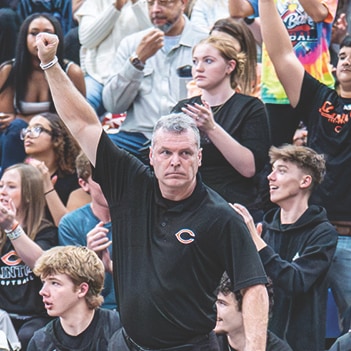An answered prayer on the Borderland

In the historical painting by George Bingham, Boone is shown leading settlers into Kentucky.
It sat a little ways back from the Kentucky River, nestled in a little valley with cliffs jutting up in front and in the back. Branson was able to maintain a friendship with the Indians for several years.
The native Americans learned that he could be trusted, resulting in Branson and his wife feeling secure in an insecure environment. When Indians came by his home, Branson offered them food from the larder where it was stored.
Late one afternoon, a noticeably intoxicated Indian arrived at their cabin.
“Fire water,” he said. “Want fire water.” Branson had none, but the tall Indian didn’t accept his reply and became irate.
“Give me whiskey or I kill all of you,” he declared.
Branson believed the brave may attempt to harm them, so he cautiously watched the young brave as his wife nestled their daughter in her arms in the corner of the cabin.
Suddenly, the Indian drew back his tomahawk to strike Branson, who proceeded to hit him with his fist, knocking the Indian to the dirt floor of the cabin. After Branson took the Indian’s tomahawk, he bound him to prevent any further hazard.
Soon the Indian regained his consciousness and struggled for several minutes to get free before sinking into a drunken stupor.
Early the following morning, Branson removed the leather bindings from the Indian before he awoke.
He was in a puzzled state upon awakening and soon grabbed his belongings, exited the cabin and vanished into the nearby timber.
“That’s one Indian we must dread,” he said to his wife. “Especially if he has whiskey.”
The summer came and went without seeing the Indian again. Following a hunt in the fall, Branson thought he saw an Indian lurking in the bushes. When he paused for a closer look, the figure was gone. He decided he needed to caution his wife again to remain alert during his absence.
“Darlin’ I noticed bear tracks nearby,” he said. “You had best stay close to the cabin and remain alert while I’m gone.”
Rufus was less than direct, but he knew it would have the desired result. Not long thereafter, Rufus heard his dogs yelping in the timber near the river and he could tell by their bark that something had spooked them. He grabbed his rifle and headed in the direction of the barking.
He soon saw fresh bear tracks, and could hear the dogs were in pursuit down the river. After several miles he caught up with the bear and dropped it with one shot.
He tied the meat to a tree, out of the reach of cat or wolf, and headed back to his cabin to get his horse. He would return for his catch.
As he neared his cabin he heard an alarming scream and he was immediately concerned for his wife, who was shrieking at the top of her voice.
He was also concerned for their child. He remained hushed as he hastened toward the noise in order to catch any intruding man or animal by surprise.
When the cabin came into view, he saw his wife with outstretched arms peering upward on the mountain.
“My baby,” she yelled. “Don’t take my baby girl.”
Branson looked toward the mountain and saw an Indian climbing toward the top, a bundle in his arms. It appeared to be the Indian who had come to their cabin drunk, but that didn’t matter now.
It only mattered that their daughter was being stolen.
“God help me,” he whispered as he aimed and shot at his target.
The Indian yelped and stared back toward the cabin. He had been grazed but not hurt, so he continued climbing the mountain. He knew he would be out of sight before Branson could reload.
“Missed by just a coupla inches,” someone said from nearby as they loaded a double round of powder into their “five-foot, three-inch” flintlock rifle.
It surprised the distressed Branson, who didn’t know anyone else had arrived at the time.
The stranger already had his left foot planted and was drawing a bead on the Indian.
“For God’s sake, man, be careful,” Branson begged. “That’s our little girl.”
“Jesus, dear Jesus,” the child’s mother was praying aloud. “Return her safely, dear Jesus.”
Two sharp clicks of the rifle’s drawing hammer signaled the crucial moment that would follow.
The Indian had looked back and seen that another marksman was taking aim, so he held the little girl in front of his chest as a shield.
The report of the rifle startled Branson, even though he had expected it.
When the white smoke drifted away and their vision cleared, the Bransons could see that the Indian had let loose of their daughter. The Indian reeled about and fell onto a rock. Branson ran to his daughter with the mother not far behind. She was safe and sound.
“Who are you?” Branson’s wife asked the stranger. “We want to mingle your name in our prayers.”
“Dan’l Boone,” came his reply. “And thanks, I can use your prayers.” With that, Daniel Boone was gone.
Daniel Boone’s family Bible is on display at the Frazier Historical Arms Museum in Louisville.
Copyright Jadon Gibson 2023. Gibson, a freelance writer from Harrogate, was born at the base of Black Mountain, Kentucky. His writings are both historical and nostalgic in nature. Thanks to Lincoln Memorial University, Alice Lloyd College and the Museum of Appalachia. for their assistance.

